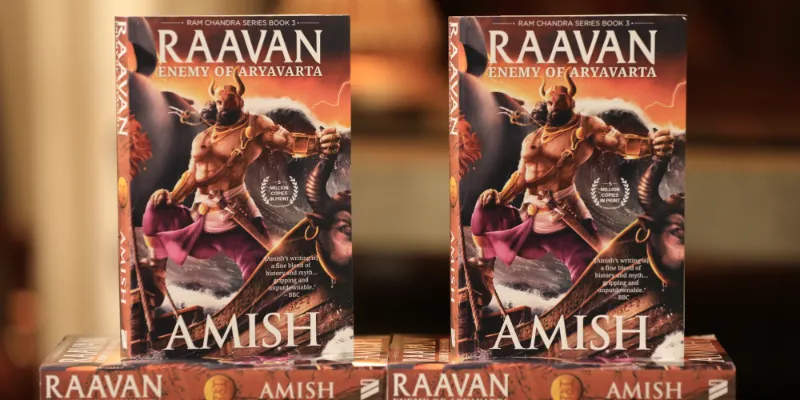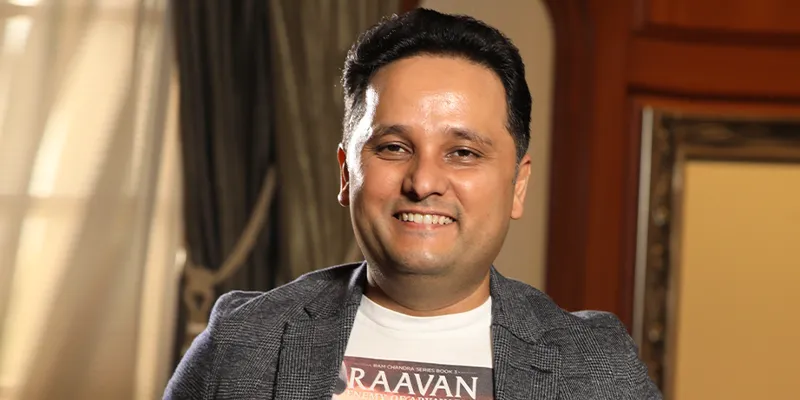Writing about mythology makes me more Indian: Amish Tripathi, author of Shiva Trilogy
In an exclusive interview with YSWeekender, author Amish Tripathi spills the beans on his latest release, Raavan: Enemy of Aryavarta, what brought him to Indian mythology, his inspiration in life, and his darkest character so far - the King of Lanka
A banker for 14 years and now a bestselling author, Amish Tripathi has donned many caps in his nine-year-long writing career, and with panache.
An IIM-Calcutta graduate, the 44-year-old’s entered the world of publishing in February of 2010 when he debuted with The Immortals of Meluha, the first book of his Shiva Trilogy. A riveting mash-up of mythology and fiction, the novel was an instant hit with readers and soon became a cult favourite with the subsequent release of sequels The Secret of the Nagas and The Oath of the Vayuputras.
Indian readers, especially young adults, at the time, were just warming up to literature outside of the popular genres. That a humanised treatment could be imparted to figures and deities from the Indian mythology was a relatively fresh concept if not niche.
With his sixth book just out Raavan: Enemy of Aryavarta, YSWeekender caught up with the banker-turned-author to find out what brought him to Indian mythology, his inspiration, and his darkest character so far - the King of Lanka.

Amish Tripathi
Edited excerpts from the interview
YSWeekender: What does it mean to be a best-selling author? Does it mean the freedom to write what you want or stick to the genre that has become immensely popular with the readers?

Amish is an IIM-Calcutta graduate
Amish: No one can give you freedom, you can only take it for yourself. If someone wants to surrender their freedom, then even the so-called “bestseller” tag can become a prison. I believe, when you are writing, you should set your mind completely free; you shouldn’t think about whether publishers or critics or readers or anyone else will like it or not.
It’s the voice of your soul - write with the honesty of your heart. Whether the book works or doesn’t, that’s up to the divine. Leave that for the later; write with your heart.
YSW: Tell us about your latest book Raavan: Enemy of Aryavarta
Amish: Raavan is the third book of the Ram Chandra series. It’s probably the darkest book that I have ever written.

Amish's new book, Raavan: Enemy of Aryavarta has just been released

While writing, like I said, I don’t really think too much about how people will react to it. I just write for myself. But in the marketing phase, one starts getting nervous. So, I didn’t really know how my readers will react to this because they are not used to something so dark from me. Having said that, there are many TV series, which are much darker… but by God’s grace, the first week has done really well.
YSW: What brought you to Indian mythology?
Amish: Good fortune of birth… I learned a lot about our scriptures and our philosophies from my family. My grandfather was a pandit and a teacher; and on my mother’s side, my grandmother was a teacher. I guess the atmosphere that we had at home - a very dharmik (religious), knowledge-obsessed kind - certainly helped and guided me in this direction.
YSW: Was it a conscious decision to write on this genre, considering the sensitivity in India when it comes to religion?

Amish believes that books are the voice of a writer's soul

Amish: The approach of looking at the stories of our gods and goddesses and reinterpreting them is a very rich Indian tradition. I am not doing anything new. I always say this, I am not being less Indian. In fact, I am being more Indian. The key thing is one must do it with respect. And all my books are written with respect. I am deeply proud of our ancient culture and I genuinely worship the gods and goddesses that I write on, so then there’s no need for any controversy.
There’s no harm in being sensitive. Controversy erupts when there’s a belief that there’s space only for one truth, not multiple truths. But our most ancient scripture, the Rigveda, says, “ekam sat vipra bahudha vadanti” – the truth is one, but the wise men speak it as many!
YSW: Your approach to Raavan is quite interesting. You don’t really use the word “evil” to describe him. He is almost the misunderstood hero; what was your idea going into this?
Amish: “Evil” is a very loaded word. It has a lot of connotations. There is no exact translation for the word “evil” in Vedic Sanskrit, which is the language of our ancestors. It’s because our ancestors saw the world in a much more nuanced way - real life has shades of grey and there are things to learn even from those you would call “villains”.
YSW: Originally, the book was titled Raavan: Orphan of Aryavarta, why did you decide to change it?
Amish: When I had the first download of Raavan in my mind, my impression of him was that his own land had rejected him. As I wrote the book, I started realising that it’s the other way around, he rejected his own land.
Here, “orphan” is the wrong word as it gives the impression that he is a bechara (helpless) whereas, he actually had a lot of agency. So, I thought, the new title would work better.
YSW: When Meluha first came out, it instantly became a cult hit. Is the reception to the Ram Chandra series as you expected?
Amish: From what I have been told by my publisher, the Shiva Trilogy is the fastest-selling book series in the publishing history of India. But the Ram Chandra series is the second fastest-selling… so it has done well [laughs].
YSW: In between, you turned to non-fiction. What propelled you to write Immortal India?
Amish: All my books have a core philosophy at heart. The core philosophy at the heart of the Shiva Trilogy is the answer to the question “what is evil”. The core philosophy at the heart of the Ram Chandra series is an answer to the question, “what is an ideal society”.
The story is a wrapper around it. In a way, philosophy is step one, the story is step two. Immortal India was in a way, just presenting step one straight out - my philosophies and my thoughts.
YSW: After working in the banking sector for 14 years, how did a man of finance turn to writing and become an author?
Amish: The way I see it, if I can do it, anyone can. The thing with my banking career is that it has certainly helped me manage the business side of my writing a lot better. There are so many artists who are good at their craft but don’t manage the business side well. As a result, they do not make enough money.
This starts impacting their lives because they can’t pay their bills, which in turn, starts impacting their creativity. So, in some sense, my banking experience helped me manage the business side of my creativity a lot better, helping my creativity as well.
YSW: Did you regret being in the banking sector for as long as you did?

Amish: Not at all. There was no dishonour in that job. I can’t say it was a really exciting job. One doesn’t get up in the morning and think “Yay, am going to work in a bank". But it’s not a dishonourable job - it’s a good job, it pays you well to meet all your responsibilities.
I come from a middle-class background. Because of my banking career, I could meet all my responsibilities and fulfil lifestyle dreams to my family I couldn’t even have imagined when I was in college.
YSW: What are your biggest takeaways from being a banker?
Amish: Discipline and managing your personal finance well. Money is this thing, which will not necessarily give you a good life but its absence can cause a lot of problems.
YSW: Who are your inspirations in life?
Amish: My family… I am lucky to be living and have lived with many of my greatest inspirations. My father-in-law, my brother-in-law (my elder sister’s husband) - they have been like father figures to me.
One can acquire knowledge but what kind of person you should be, role models for good character… if one is lucky to have that kind of influence, then there’s nothing like it.
YSW: If you were to write Meluha today, would your approach be the same?
Amish: Exactly the same. Except I wouldn’t have wasted my time making those flowcharts. It’s the only book I have tried it for and it was a complete flop. I wouldn’t waste my time doing that.
I would straight away start with instinctive writing, which is how I write now.










